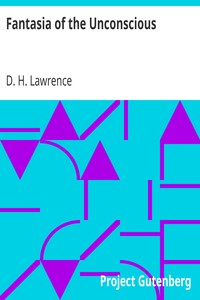| Author |
Lawrence, D. H. (David Herbert), 1885-1930 |
| LoC No. |
22023375
|
| Title |
Fantasia of the Unconscious
|
| Note |
Reading ease score: 72.9 (7th grade). Fairly easy to read.
|
| Credits |
E-text prepared by Michael Ciesielski, Sankar Viswanathan, and the Project Gutenberg Online Distributed Proofreading Team
|
| Summary |
"Fantasia of the Unconscious" by D. H. Lawrence is a philosophical essay written in the early 20th century. The work explores the nature of the unconscious mind, human relationships, and the dynamic interplay of sexuality, creativity, and consciousness. Lawrence’s writing reflects his views on psychoanalysis, spirituality, and the essence of life, emphasizing a subjective interpretation of human experience over objective scientific reasoning. The opening of the text presents a foreword where Lawrence directly addresses readers, expressing a disdain for those who seek to critique his work without understanding its depth. He introduces the concept of the unconscious, criticizing the reductionist views of psychoanalysis, particularly those of Freud. Lawrence argues that while sexual motives play a significant role in human behavior, they are not the sole drivers of our actions. Instead, he posits that a higher, creative impulse motivates human activity and urges a redefinition of how we understand human desires and motivations, laying the groundwork for the themes to be explored in the subsequent chapters. (This is an automatically generated summary.)
|
| Language |
English |
| LoC Class |
BF: Philosophy, Psychology, Religion: Psychology, Philosophy, Psychoanalysis
|
| Subject |
Subconsciousness
|
| Subject |
Sex
|
| Subject |
Psychoanalysis
|
| Category |
Text |
| EBook-No. |
20654 |
| Release Date |
Feb 24, 2007 |
| Copyright Status |
Public domain in the USA. |
| Downloads |
231 downloads in the last 30 days. |
|
Project Gutenberg eBooks are always free!
|

